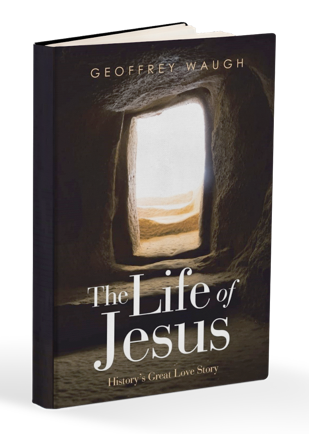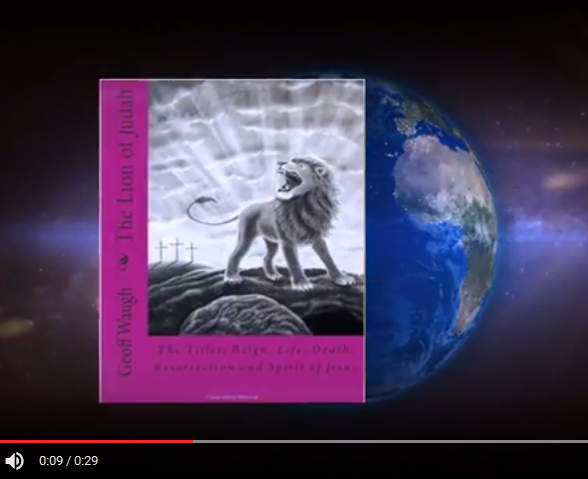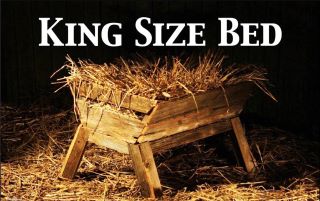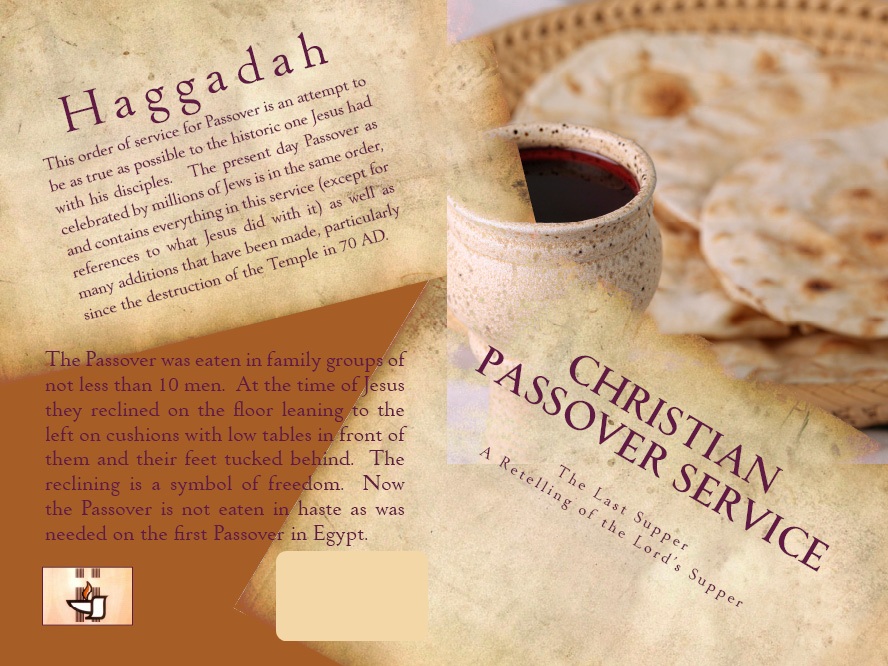

CHRISTIAN PASSOVER SERVICE
A re-telling of the Last Supper
Permissions: You can reproduce any Renewal Journal resource, including in print, such as this book, eg your Amazon KDP.
Share good news – Share this page freely
Copy and share this link on your media, eg Facebook, Instagram, Emails:
Christian Passover Service:
https://renewaljournal.com/2013/03/31/passover-meal-service/
See also: Holy Week, Christian Passover & Resurrection
https://renewaljournal.com/2018/03/24/holy-week-christian-passover-resurrection-3-books-in-1/
FREE RENEWAL JOURNAL SUBSCRIPTION: for updates, new Blogs & free offers
FREE PDF books on the Main Page

Book Trailer
* SUBSCRIBE for free to be told of new Blogs, new Books, and new Blessings – eg. free offers and revival news.
HAGGADAH ‑ The Telling
HAGGADAHS contain the Passover Service.
This order of service for Passover is an attempt to be as true as possible to the historic one Jesus had with his disciples. The present-day Passover as celebrated by millions of Jews is in the same order and contains everything in this service (except for references to what Jesus did with it) as well as many additions that have been made, particularly since the destruction of the Temple in 70 AD.

ITEMS NEEDED
HAGGADAHS ‑ Passover Order of Service.
UNLEAVENED BREAD ‑ “Matzo” (pierced and striped)
Available from delicatessans or David Jones.
BITTER HERBS ‑ 2 kinds:
1st Dipping ‑ parsley or lettuce,
2nd Dipping ‑ grated horse radish or grated onion
(about 1 teaspoon per person).
CHAROSETH ‑ mixture to resemble mortar used in slavery.
Chopped apples (allow to turn brown ‑ no lemon juice),
Chopped walnuts, sultanas or raisins or dates,
with a little honey and wine to stick it together.
CANDLES ‑ 2 white candles and candle holders; matches.
SALT WATER or VINEGAR ‑ for 1st Dipping.
ROAST LAMB ‑ other foods optional: dates, figs, olives, grapes,
onions, cucumber, garlic, melon, lentils.
RED WINE mixed with water ‑ each person drinks 4 cups of it.
CUSHIONS ‑ to recline on.
PRESENTATION
The Passover was eaten in family groups of not less than 10 men. At the time of Jesus they reclined on the floor leaning to the left on cushions with low tables in front of them and their feet tucked behind. Reclining is a symbol of freedom. The Passover is not eaten in haste as was needed on the first Passover in Egypt. One’s best festive clothes are worn in honour of the occasion. Psalms were sung; appropriate worship songs may be used. The prayers are read in unison, unless otherwise indicated.

THE PASSOVER SERVICE
1. LIGHTING THE CANDLES
The lady of the house lights the candles and says:
Blessed are you, Lord our God, King of the Universe, who has sanctified us by your commandments and has commanded us to kindle the Festival light.
Blessed are you, Lord our God, King of the Universe, who has preserved us alive and sustained us and brought us to this season.
[As the woman begins the Service and gives light to the Passover table, so it was a woman who began the redemptive career of Messiah our Passover by giving birth to the Light of the World.]
2. FIRST CUP ‑ Cup of Blessing
Fill the first cup.
Blessed are you, Lord our God, King of the Universe, Creator of the fruit of the vine.
Blessed are you, Lord our God, King of the Universe, who chose us above all nations, and hallowed us with your precepts. So you gave us, O Lord God, in your love, Sabbaths for rest, anniversaries for gladness, feasts and holy days for rejoicing, and this Passover day, season of our freedom in love ‑ a holy convocation, in memory of our coming out of Egypt. For you have put your choice in us and have sanctified us of all peoples, and have given us your Sabbath and holy festivals as an inheritance, in love and desire, in joy and gladness.
Blessed are you, Lord who sanctified the Sabbath, Israel and the festive seasons.
Blessed are you, Lord our God, King of the Universe, who has preserved us alive and sustained us and brought us to this season.
Drink the first cup.
3. WASHING THE HANDS
Blessed are you, Lord our God, King of the Universe, who has sanctified us with your commandments and has enjoined us concerning the washing of our hands.
[Concerning the washing, it is written: John 13:1‑5.]
Dip fingers into water
or follow Jesus’ example and instruction.
4. FIRST DIPPING ‑ Bitter Herb in Salt Water
Blessed are you, Lord our God, King of the Universe, Creator of the fruit of the earth.
Leader:
The rabbis say that the bitter greens represent life. The salt water represents tears. So life is immersed in tears, as it was for our ancestors in Egypt.
Dip parsley (or lettuce) in salt water and eat.
5. THE FOUR QUESTIONS
Asked by youngest son able to read.
Why is this night different from all other nights?
1. On all other nights we eat either leavened or unleavened bread; on this night why do we eat only unleavened bread?
2. On all other nights we eat herbs of every kind; on this night why do we eat only bitter herbs?
3. On all other nights we eat meat roasted, stewed or boiled; on this night why do we eat only roasted meat?
4. On all other nights we do not dip the sop once; on this night why do we dip twice?
The Answer ‑ telling of the Passover story.
Our father, Jacob lived in a country called Caanan (now called Israel). Jacob, who was an old man, had many children and grandchildren and also many flocks of sheep and herds of cattle. One year when the rainy season came and there should have been a great deal of rain to fill the cisterns and wells to make the grass grow green, there was no rain. The next year again there was no rain. The wells dried up, the grass withered and there was no water and no food for people or beasts. Jacob decided to pack all his goods and all his belongings and with his sons and his shepherds and his flocks, to go down to the land of Egypt where there was water and food enough to spare, and where Jospeh, his long lost son, was waiting for him.
That is how the children of Israel (because Jacob’s other name was Israel) came into Egypt and settled there and lived happily in the green fields by the Nile River. Those were good years while Jospeh lived and a kindly Pharaoh ruled over Egypt. The children of Israel and their flocks prospered and multiplied.
The time came when Joseph grew old and died and so did all his brothers and the good Pharaoh who had welcomed the children of Israel to Egypt. Later, a bad Pharaoh ruled and said to his people, “See, there are too many children of Israel living with us. Let us be cruel to them. Let us make them build cities and storehouses for us, and well not pay them but we shall beat them till they can work no harder.” And so it happened that the free Israelites were enslaved and cruelly treated and forced to bake bricks in the hot Egyptian sun.
Because we were slaves to Pharaoh in Egypt the Lord our God brought us out with a mighty hand and an outstretched arm. If the Most Holy (blessed is he!), had not brought our ancestors out of Egypt, we, and our children, and our children’s children, would still continue in bondage to the Pharaohs in Egypt.
Blessed is he who keeps his promise to Israel. Blessed is the Most Holy, who premeditated the end of the captivity that he might do what he had promised to our father Abraham, as it is said: And he said to Abraham, “Know for certain that your seed shall be strangers in a land that is not theirs and shall serve them, and they shall afflict them 400 years. And also that nation whom they shall serve, will I judge; and they shall go out with great substance.”
It is this same promise which has been the support of our ancestors and of us also; for not only one nation has risen up against us, but in every generation there are some who rise up against us to annihilate us. But the Most Holy (blessed is he!), has delivered us out of their hand. And the Lord brought us out from Egypt with a strong hand and with an outstretched arm, with terror, and with signs and wonders.
Read Exodus 7: 1 ‑ 14.
6. THE PLAGUES.
Fill second cup. Leader says:
Though we celebrate our liberation, our happiness is not complete as long as others remain bound to slavery and death.
Leader raises cup and continues:
A full cup is a symbol of complete joy. Let us, therefore, diminish our cups as we recall the plagues which befell the Egyptians.
Each participant empties a drop from his cup for each one of the ten plagues:
Blood. Frogs. Lice. Flies. Cattle disease. Boils. Hail. Locusts. Darkness. Slaying the first‑born.
7. PASCHAL LAMB, UNLEAVENED BREAD, BITTER HERB
Leader: Whoever does not mention the three things used on the Passover has not done his duty, and these are: the paschal lamb, the unleavened bread and the bitter herb (Exodus 12:8).
Show lamb to the company.
Why do we eat the paschal lamb?
To protect the children of Israel, God commanded the head of each household to sacrifice a spotless lamb and to apply its blood to the doorway of his home, first to the top of the doorway, the lintel, and then to the two sideposts. The paschal lamb signifies that the Most Holy (blessed is he!) passed over our fathers’ houses in Egypt, as it is said: You shall say, “It is the Lord’s sacrifice of the Passover because he passed over the houses of the children of Israel in Egypt when he smote the Egyptians and delivered our houses” (Exodus 12:27).
[Concerning the Messiah, it is written:
Isaiah 53:7; John 1:29; 1 Peter 1:18; Rev. 5:12.]
Show unleavened bread to the company.
Why do we eat unleavened bread?
There was not enough time for the dough of our ancestors to leaven before the Supreme King of Kings (blessed is he!) appeared to them and redeemed them, as it is said: “They baked unleavened bread of the dough which they brought out of Egypt, for it was not leavened because they were thrust out of Egypt and could not tarry because they had no time to prepare food for themselves” (Ex. 12:39).
Show bitter herb to the company.
Why do we eat bitter herb?
The Egyptians embittered the lives of our ancestors in Egypt, as it is said: “They embittered their lives with cruel bondage, in mortar and brick and in all kinds of labour in the field; all their service in which they made them labour with rigour” (Ex. 1:14).
It is therefore incumbent on every Israelite, in every generation, to look upon himself as if he had actually gone out from Egypt, as it is said: “And you shall declare to your son, on that day, saying, ‘This is done because of what the Lord did for me when I came out from Egypt. It was not our ancestors only that the Most Holy (blessed is he!) redeemed from Egypt, but us also he redeemed with them, as it is said, “And he brought us out that he might bring us to the land which he swore to give to our fathers.”‘”
We therefore are privileged to thank, praise, adore, glorify, extol, honour, bless, exalt, and reverence him who did all the miracles for our ancestors and us. He brought us from bondage to freedom, from sorrow to joy, from mourning into holy days, from darknss to great light, and from servitude to redemption; so therefore let us sing to him a new song, Hallelujah!
8. SECOND CUP ‑ Cup of Thanksgiving
Psalms 113 and 114 are recited.
Blessed are you, Lord our God, who has redeemed us and redeemed our fathers from Egypt.
Blessed are you, Lord our God, King of the Universe, Creator of the fruit of the vine.
Drink the second cup.
9. SECOND DIPPING ‑ The Mixture (Charoseth)
The Leader breaks a piece of unleavened bread (Matzo).
This is the bread of affliction and poverty.
Blessed are you, Lord our God, King of the universe, who brings forth bread from the earth.
Blessed are you, Lord our God, who sanctified us with your commandments and commanded us to eat unleavened bread.
All take a piece of unleavened bread with bitter herbs on it and dip into the mixture (charoseth) and eat.
The charoseth is to remind us of the bricks we made while in bondage. We may ask ourselves, “Why should it taste so sweet?” The rabbis respond: “Even the bitterest of labour tasted sweet when we knew that redemption drew near.”
[Jesus commented that one who had dipped his hand in the bowl with him would betray him (Mt. 26:20‑23).]
10. THE PASSOVER MEAL
All eat the roast lamb and food in a relaxed way, without ceremony.
NOTE: Lamb is no longer eaten at Passover since the destruction of the second temple in 70 AD. Other roast meat is eaten instead.
At the end of the meal everything is cleared away except the unleavened bread and wine.
GRACE AFTER THE MEAL:
[Traditionally, grace is said after the meal.]
Blessed be the name of the Lord, now and forever;
Blessed be our God whose food we have eaten and
through whose goodness we live.
PRAYER:
Blessed are you, Lord our God, King of the Universe, who feeds the whole world with your goodness, and with your grace, kindness and mercy gives food to every creature; for your mercy endures forever.
And through your great goodness sustenance has never failed us, and may it not fail us for ever and ever, for the sake of your great name; for you are the God who feeds and sustains all, and deals bountifully with all, and provides food for all the creatures that you have created.
Blessed are you, O Lord, who gives food to all.

11. COMMUNION INSTITUTED
Read John 6: 32 ‑ 35.
Jesus took the bread and gave thanks…
Blessed are you, Lord our God, King of the Universe,
who brings forth bread from the earth.
… and broke it, and gave it to them, saying, “This is my body given for you; do this in remembrance of me” (Luke 22:19).
[The bread is unleavened; it is striped and it is pierced.
Even so the Messiah was unleavened, that is sinless;
Even so the Messiah was striped by the Roman whip;
Even so the Messiah was pierced by the nails in his hands
and his feet and by the spear in his side.]
Read Isa. 53:5.
Break and eat the bread together.

12. THIRD CUP ‑ Cup of Redemption
Fill the third cup.
Concerning this cup, it is written:
In the same way, after the supper he took the cup, saying, “This cup is the new covenant in my blood, which is poured out for you” (Luke 22:20).
Blessed are you, Lord our God, King of the Universe, Creator of the fruit of the vine.
Drink the third cup.
13. FOURTH CUP ‑ Cup of Praise
Fill the fourth cup.
Psalms 115 ‑ 118 are recited.
Blessed are you, Lord our God, King of the Universe, Creator of the fruit of the vine.
Drink the fourth cup.
14. THE GREAT PRAISE ‑ Final Song
Psalm 136 is recited.
When they had sung a hymn they went out to the Mount of Olives (Mark 14:26).
RESOURCES
Buksbazen, Victor, The Gospel in the Feasts of Israel. Philadelphia: Friends of Israel, 1954.
Edersheim, Alfred, The Temple, Its Ministry and Services as they were at the Time of Jesus Christ. Eerdmans, 1954.
Edersheim, Alfred, The Life and Times of Jesus the Messiah. Grand Rapids: Eerdmans, 1962.
Gilbertson, Merrill, The Way it was in Bible Times. Minneapolis: Augsburg, 1959.
Levy, Isaac, A Guide to Passover. London: Jewish Chronicles, 1958.
Rosen, Ceil & Moishe, Christ in the Passover. Chicago: Moody, 1968.
Encyclopedia Judaica. Jerusalem: Keter, 1971.
The following Passover Haggadahs:
Birnbauum, Philip. New York: Hebrew Pub. Co., 1953.
Bronstein, Herbert, ed. New York: Central Confrence of American Rabbis, 1975.
Glatzer, Nahum. New York: Schocken, 1953.
Lipson, Eric‑Peter. San Franscisco: JFJ Pub., 1986.
Regelson, A. New York: Schulsinger, 1958.
Schaifstein, Ben‑Ami. New York: Shilo, 1959.
Szyk, Arthur, & Roth, Cecil. Israel, Alumoth, n.d.

MANDATUM – A NEW COMMANDMENT
“mandatum”, meaning a commandment. Jesus Christ, at the Last Supper, commanded:
‘A new commandment I give to you that you love one another. As I have loved you, so you must love one another.
By this all will know that you are my disciples, if you have love for one another.’ (John 13:34-35).
 Now there was also a dispute among them, as to which of them should be considered the greatest. And he said to them …
Now there was also a dispute among them, as to which of them should be considered the greatest. And he said to them …
‘But not so with you; rather the greatest among you must become like the youngest, and the leader like the one who serves. … I am among you as the one who serves’ (Luke 22:24-27).
And supper being ended [some manuscripts: during supper] … Jesus rose from supper and laid aside his garments, took a towel and girded himself. After that, he poured water into a basin and began to wash the disciples’ feet, and to wipe them with the towel with which he was girded. … So when he had washed their feet, taken his garments, and sat down again, he said to them, ‘Do you know what I have done to you? … I have given you an example, that you should do as I have done to you. Truly I say to you, a servant is not greater than his master; nor is he who is sent greater than he who sent him. If you know these things, blessed are you if you do them’ (John 13:2, 15-17).
RELATED BOOKS

The Life of Jesus: History’s Great Love Story – Blog
The Life of Jesus: History’s Great Love Story – PDF

Holy Week, Christian Passover & Resurrection – Blog
Holy Week, Christian Passover & Resurrection – PDF
3 BOOKS IN 1:
Holy Week, Christian Passover Service, and Risen
READ SAMPLE
Save
Save
Save
Save
Like this:
Like Loading...


![]()
 Palm Sunday
Palm Sunday






























































